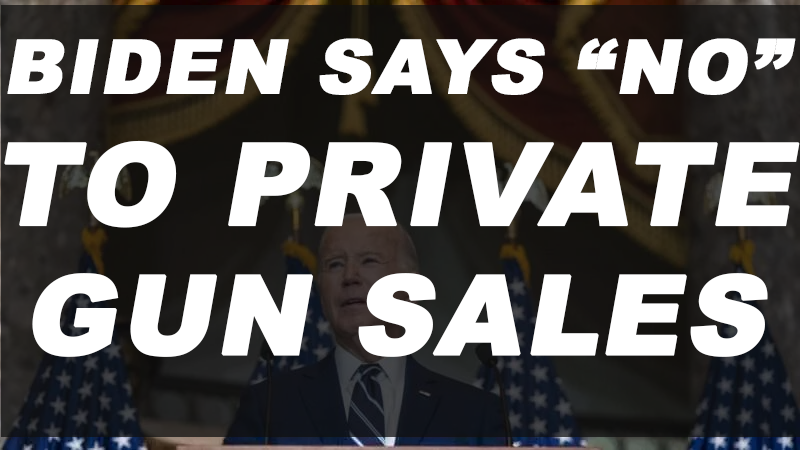Biden Moves to try and have the ATF in MORE of your shit by trying to push for background checks on the secondary market.
Under current federal law, background checks are required only for sales by federally licensed dealers. A rule that the ATF proposed last September would expand the definition of “dealer” to encompass some but not all occasional gun sellers. But even that controversial proposal does not go as far as the plan described by Empower America’s sources, who say “the ATF has drafted a 1,300-page document in support of a rule that would effectively ban private sales of firearms from one citizen to another by requiring background checks for every sale.”
As the Congressional Research Service explains, that change was “intended to require persons who buy and resell firearms repetitively for profit to be licensed federally as gun dealers, even if they do not do so with ‘the principal objective of livelihood.'” According to the amendment’s supporters, “there was confusion” about whether the definition of dealers as people “engaged in the business of selling firearms” covered “individuals who bought and resold firearms repetitively for profit, but possibly not as the principal source of their livelihood.” The statutory definition still explicitly excludes “a person who makes occasional sales, exchanges, or purchases of firearms for the enhancement of a personal collection or for a hobby, or who sells all or part of his personal collection of firearms.”
The proposed rule that the ATF published in the Federal Register on September 8 addresses what it means to be “‘engaged in the business’ as a dealer in firearms.” Previous proposals considered by the Obama administration and pitched by Vice President Kamala Harris when she ran against Biden in the 2020 presidential primaries would have deemed someone a “dealer” if he sold more than a specified number of firearms in a year. But “rather than establishing a minimum threshold number of firearms purchased or sold,” the ATF says, “this rule proposes to clarify that, absent reliable evidence to the contrary, a person will be presumed to be engaged in the business of dealing in firearms” if he meets any of several criteria.
Someone would be presumptively considered a dealer, for example, if he “sells or offers for sale firearms, and also represents to potential buyers or otherwise demonstrates a willingness and ability to purchase and sell additional firearms.” Likewise if he “spends more money or its equivalent on purchases of firearms for the purpose of resale than the person’s reported taxable gross [income] during the applicable period of time.” Or if he “repetitively sells or offers for sale firearms” within 30 days after buying them, repetitively sells guns that are “new” or “like new” in the original packaging, or repetitively sells guns of “the same or similar kind” and “type.”
Some of these categories, especially the last one, could conflict with the statutory exclusion of collectors and hobbyists. And the ATF adds that “the activities set forth in these rebuttable presumptions are not exhaustive of the conduct that may show that, or be considered in determining whether, a person is engaged in the business of dealing in firearms.” It says “a person would not be presumed to be engaged in the business requiring a license as a dealer when the person transfers firearms only as bona fide gifts, or occasionally sells firearms only to obtain more valuable, desirable, or useful firearms for their personal collection or hobby, unless their conduct also demonstrates a predominant intent to earn a profit.”
That “predominant intent to earn a profit” criterion, which is supposed to conform with the change made by the BSCA, potentially extends the definition of “dealer” to encompass the collectors and hobbyists that Congress explicitly sought to protect. In essence, says Independence Institute gun policy expert David Kopel, the ATF is “purporting to require anyone who sells a firearm for a profit, ever,” to obtain a dealer’s license.
The plan that Empower Oversight describes would go even further. If it would in fact cover “every sale,” it would not matter whether the seller made money, let alone whether that was his “predominant intent.” That “seems like something that is legally impossible,” Kopel says.
It seems legally impossible because the only way to expand the federal background check requirement “without additional legislation” is by treating more sellers as dealers and requiring them to obtain licenses. The ATF claims the BSCA gave it the authority to do that. But that law plainly did not give it the authority to simply decree that anyone who buys a gun has to pass a background check.
States that notionally mandate “universal background checks” do so through laws that require private sellers to complete transactions via federally licensed dealers. Research suggests those requirements are widely flouted by gun owners who either are unaware of the law or object to the cost and inconvenience that compliance entails. In any event, this option is not available to the ATF “without additional legislation.”


